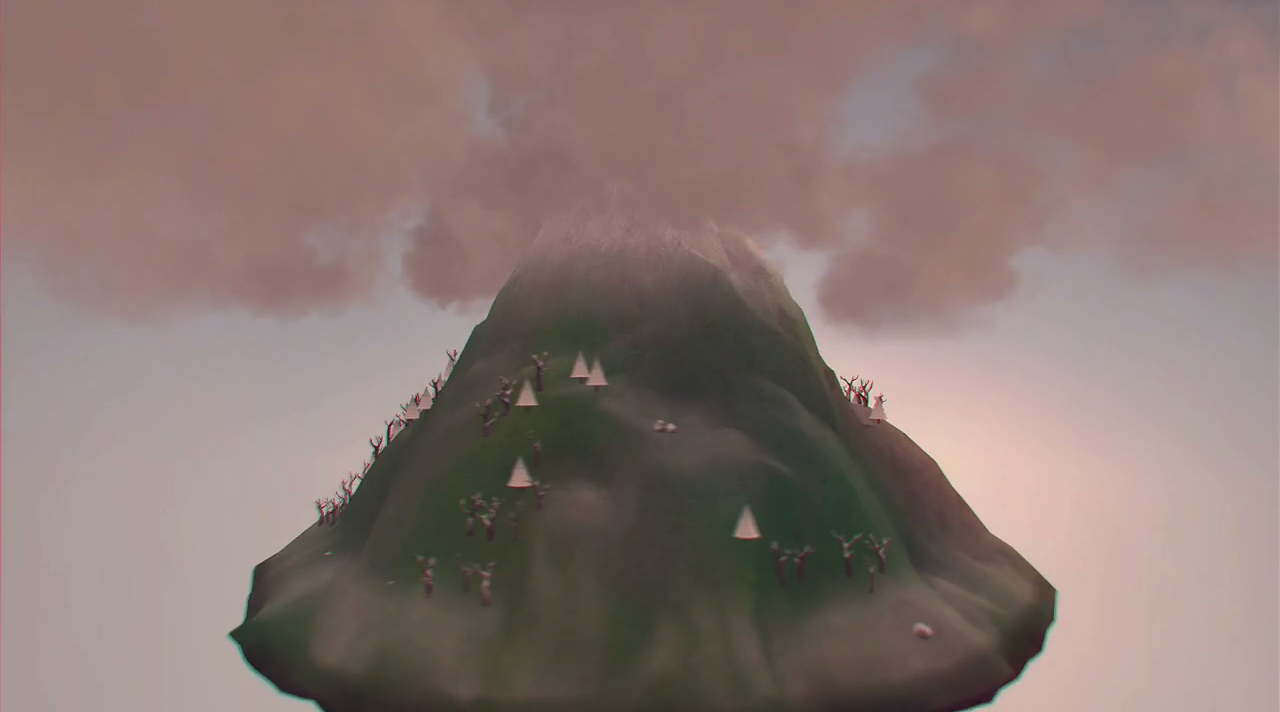Yesterday, artist David OReilly released Mountain, a simulator-style $1.00 game for Mac/PC/Linux/iOS. Upon install, some are asked to scribble “love,” others “confusion” or “meaning” or “purpose,” and then, the mountain generates. These are the game features:
no controls
automatic save
audio on/off switch
time moves forward
things grow and things die
nature expresses itself
~ 50 hours of gameplay
once generated, you cannot be regenerated
I have been playing the game for about 20 hours.
The game is not a game in a traditional sense, but everything is a sort of a game, OReilly told The Verge, whose journalist was emotionally touched by the various ways nature expresses itself on this Mountain. But there’s more, even before the giant horses, skulls and tubas “suddenly” generate out of your mountain when you look away during a storm. Mountain is a generative, digital artwork, personalized for each viewer and their individual complexes and dreams.

Mountain does actually have controls, but they are for observing the landscape at different angles, not interacting with it. Although, when you spin it, time feels as if its moving slightly faster. Or is it?

The horse did not appear until this morning. For the first few hours, the sun would set and arise every few minutes. I kept the game on and switched back to the dozen simultaneous editorial and social buttons that needed to be clicked and words that needed to be tapped out, listening to the sounds of the wind, the rustling of the trees and, sometimes, rain and gust. Occasionally, a choral singing would flood the soundscape. If I returned to my Mountain, I would be rewarded with a brief statement, a simple, melancholy observation. Sometimes, I’d stay until the sunset, the dark, the fireflies, till looking at a digital fucking rock softly rotating in “space.”
In bed with a Miyazaki Torrent on the computer monitor, I’d hear the choral rise, emerging out of the background, and then fading a second later. There it goes again. There it goes. Mountain became part of life.

The soundscape is thick, somewhat responsive. The closer you zoom in, the more detailed and crisp the Earthly sounds become. Zoom out, and they fade. As you leave the rainbow rimmed atmosphere of the floating, inexplicably lit chunk of earth, the universe itself begins to hum with a ringing, vibrating flow. Spin around at night and the starry rifts of neon blue galaxies are most visible. You might see a red field of light, rumbling in the distance, beyond. But that’s not for you to see. You’re only God of this Mountain. You can’t get to close and you can’t get too far.

There are many facets of OReilly’s work that I’ve loved. The humor of his dumb teen internet lifestyle parody shirts in giddy Comic Sans. That brief moment in his neu-existential animated short The External World, when a cartoonish character cheerfully takes a shower to happy music while a more realistic render bleeds out into the tub from her sliced veins. That episode of Adventure Time that he directed, where its universe begins to shatter into glitches. The video game he imagined for Her. This is the most involved I’ve been with something he’s created.
We’re only half-way through. What season is it? It’s Winter. A sparkling layer submerges all, then recedes.

Each Spring, like each sunrise, is a little bit different. How any personalized algorithms were generated into this landscape, I don’t know. I know some friends’ horses and tubas began to jut out of different edges of Mountain, but what did it have to do with our individual impressionistic scribbles of “love” and “confusion?” How is my Mountain’s weather different than your Mountain’s and is mine colder or windier? Is this what it feels like to create, and let go? To not anticipate the consequences of small, cathartic decisions?
My beautiful perfect Mountain is now cluttered with man-made-like images of superfluous objects that have crashed here. Have those clouds always been so grey?
What now?
Do I wait for night, when I can’t see them anymore, so I can just listen?
Or do I destroy this?
I can’t start over if I do.
How do I destroy this?

UPDATE: See how it “ends” and images of “failed” mountains in our feature interview with David OReilly.
(Screenshots: ANIMALNewYork)



